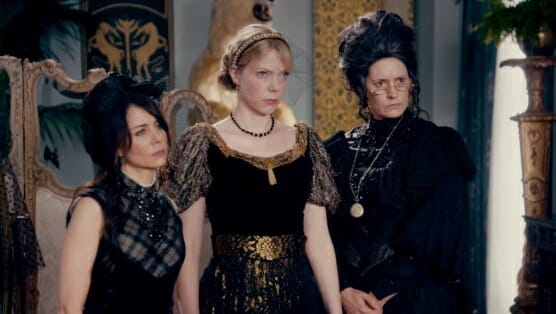
It’s two steps forward and one step back for Another Period. Whatever progress last week’s episode made—with turns both character developing and comedic—the show misspends it with “Funeral.” No amount of Rich Fulcher (who drunkenly plays Mark Twain, replete with a handful of impertinent one-liners) or Tim Heidecker (who plays Hal Carnegie—think Carnegie Hall) can save what follows.
Having paid off their husbands to disappear, Lillian and Beatrice now throw a funeral. The massive spectacle is less about mourning their husbands’ “deaths” than a chance to make new matches. Or at least it is in Lillian’s case; Beatrice is still content with her brother Frederick.
In addition to this central plotline, Victor and Albert find that their new life together isn’t as idyllic as expected, head butler Mr. Peepers gets a visit from his adopted Native American family upon the death of their father, and Chair must corral the children in order to tell them their fathers have died.
This week, the show’s running commentary about life in the early 20th century turns its attention to children. In last week’s cold open, Lillian shared her disdain about children, particularly girls, and here that set-up gets a larger payoff. In the nursery, where the children run rampant, Chair asks their names. “I’m Susan,” one says. “I’m also Susan,” responds another. “What’s a name?” asks a third girl. Females don’t warrant individuality, bred as they are to a secondary gender position. How the Bellacourt sisters raise their daughters speaks as much to women’s subservient position as it does to the ways in which their immense wealth breeds a disregard for anyone other than themselves and their immediate pleasure. The wealthy, in this instance, are not maternal for they have people to deal with that sort of responsibility.
When Chair finally breaks the bad news, the children burst into tears, exclaiming their heartbreak over losing Mr. Peepers. One admits she thought Blanche was her father—a running joke about Blanche’s unattractiveness. With no interaction from their biological family, the children believe the servants are not just their caretakers but their actual parents. Things come to a head when Blanche arrives with the “quieting syrup,” otherwise known as morphine. Soon they’re all asleep except one, the son, who’s developed a tolerance. Children in the early 20th century are not the accessory they seem to be for certain reality TV stars in the 21st century, but their disposability again shines a sharp, albeit comedic, criticism upon their class.
Chair’s time with the children, including one small bit when she reads them a fairytale in keeping with the form’s nightmarish actuality and not Disney’s doe-eyed interpretation, is one of the strongest parts of the episode. Yet it takes a back seat to the other, more prominent storylines.
When Mr. Peepers’ Native American family visit him in order to perform a ceremony releasing their father’s spirit into the next world, the storyline falls short. In part, that’s because Mr. Peepers is one of the weakest characters, so this extended foray into his background seems unnecessary. Focused as it is on wealthy white characters and the inherent privilege both their race and class bring them, Another Period invokes race as a means to criticize the Bellacourts and the circle in which they move. Mr. Peepers, whose real name is Mitch, was adopted by a Native American family when his parents (“white alcoholics who abandoned me during the gold rush on their way to California”) left him. This behavior, indicative of how white people behave, dovetails into his brother’s (Lou Diamond Phillips) assessment of the Bellacourt household as a “veritable insane asylum.” It’s apt commentary but it doesn’t keep pace in an episode chock full of other stories.
Despite some excellent absurdist sight gags—Lillian’s Chihuahua wearing a funeral veil to match her owner—and some crack-sharp one-liners, there’s too much going on for a show slightly over twenty minutes long. Another Period is at its best when it does more with less. The show has a dream ensemble cast to pack storylines with all manner of witty repartee, one-liners, sight gags, and the like; spreading that cast across multiple storylines, no matter how intertwined they may be, doesn’t serve the overarching comedy and even underscores the show’s quick and capable pacing. Simply put, something always falls flat. Even though it uses a reality TV show frame to service a turn-of-the-20th-century narrative, the show excels when it functions most like a play with edits serving as scene changes. With a cast packed to the gills with comedic talent and increasingly fantastic guest turns, multiple storylines that spread that talent thin don’t work.
The saving grace each week are the people involved in Another Period. Were it not for a stellar cast who often outperform what they’re given, the show wouldn’t be a worthy contender for Comedy Central’s growing primetime lineup, even in the dead of summer. It’s that kind of potential that makes swing-and-a-miss episodes like “Funeral” all the more painful to watch.
Amanda Wicks is a freelance writer specializing in comedy and music. Follow her on Twitter.